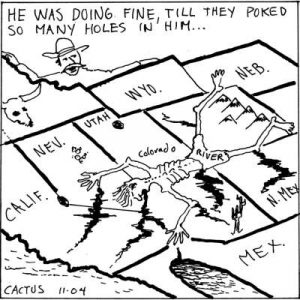Column by George Sibley
Culture – November 2004 – Colorado Central Magazine
YOU’RE RECEIVING this magazine a week or two before the election, so you may have already voted if you’re going to, and it’s probably too late to change your mind if you haven’t, so I won’t try.
But it seems to me that this election season leaves us with some things to think about, here in America, regardless of who wins or loses November 2. One thing I find myself thinking about today is the extent to which I have been living with a delusion most of my life: the delusion that we live in a “scientific age,” that five hundred years ago a “scientific revolution” occurred in Western Civilization, overthrowing a millennium or more of religiously dominated culture.
According to the conventional wisdom taught where I went to high school and college, an earth-centered universe had been supplanted by a sun-centered system out on the edge of one modest galaxy adrift in an unimaginably big universe. Rather than we humans being the center of an uber-god’s complete and perfect creation, then given dominion over that creation by said god, we were a fragile branch out on a long limb of an open-ended evolutionary process that might have no discernible purpose other than filling up time and space. And rather than knowledge and wisdom descending on us through revelation from god through prophets, we have to inductively assemble knowledge from nature through observation, analysis and experimentation.
But what this election seems to point out, among other things, is the possibility that this scientific revolution has not only not been consummated, it is still possible that it is going to get smacked down, now that it has given us the wherewithal for a lot of destructive toys. If anything, the jealous old billygod of the burning bush is resurgent today, as powerful as he has ever been in this country. (The “Billy Graham Crusade” is in town as I write.)
What we see is that the old anthropocentric, blessed-by-god forces of “dominion over creation” have used the discoveries of those working under that scientific worldview when it was convenient to their purposes to do so, and have ignored the discoveries of science when they were inconvenient. To a certain extent, the scientists, and the technologists who have applied the work of the scientists, have been doing “god’s work” instead of their own.
And now, when the scientists seem to be coming out with more bad news than good news — petroleum geologists with evidence about the imminent peak in global oil production and the onset of decline, climatologists with evidence that the earth’s delicate balance between fire and ice might be tipping toward fire, and demographers and epidemiologists and sociologists pointing out the increasingly nasty correlations between too many people and diseases and the discords of life in a pressure cooker – well, that’s not useful science, helpful science, ascent-of-man progressive godly science. So we ignore it because we know, if things do get tough … god loves us and will take care of us.
THIS DROVE ME BACK to something I read in some college course: Thomas Kuhn’s Structure of Scientific Revolutions. Kuhn argued that science had not progressed smoothly and logically in an ever unfolding “evolution” of discovery. He pointed out that even scientists, those most disciplined searchers for truth, often got stuck in “paradigms” that limited their ability to see different perspectives on their own discoveries that would lead to whole new lines of inquiry and an expanding paradigm. These paradigms became, in effect, orthodoxies, not unlike those of the churches against which science had revolted.
The scientific orthodoxy would prevail, according to Kuhn, until too much evidence of things that could not be explained by the orthodoxy began to pile up around the edges. Eventually, a “sense of malfunction that can lead to crisis” would precipitate a scientific revolution that would overthrow the orthodoxy and its guardians, and a new scientific paradigm would develop (that would, over time, develop its own increasingly rigid orthodoxy).
Kuhn limited his observations to “in-house” revolutions in the physical sciences, like the long-delayed discovery of oxygen or X-rays; but it seems that they apply equally well to revolutions in the more general cultural realm too. Like this so-called scientific revolution against religious domination. Scientists launched several major assaults on the old Judeo-Christian cultural orthodoxy – that human-centered creation, given to us perfect by god, but for which we proved imperfect and “fallen.” We saw Copernicus and Galileo challenging that orthodoxy with the hypothesis that the universe does not revolve around the earth and us. We saw Darwin challenging the orthodoxy of a creation complete and perfect with the hypothesis that everything was in a process of evolving into more diverse forms of life. Et cetera.
Those stages in the scientific revolution have been vigorously and vehemently opposed by the guardians of the religious orthodoxy, but we’ve had the delusion – taught in schools – that these scientific truths have prevailed over those earlier, less complete versions of the truth.
WHAT, THEN, are we to make of an election which seems to be a referendum on the continued cultural dominance of the jealous god of a few tribes of wandering posturban pastoral nostalgitarians? There can be no such thing as overpopulation because god told us to go forth and multiply – so no birth control, no abortions. If that means more unwanted kids destined to nightmare lives? Well, life is just a testing ground for the eternal afterlife anyway. If they bear their poverty meekly in this vale of tears, they will get their pie in the sky, by and by.
And that manly but often insecure god didn’t approve of homosexuals so we shouldn’t either. If they won’t go away when we ignore them, then we’ll have to start passing some rules.
And teach our kids godless evolution? Heaven forbid, if it isn’t at least balanced with god’s orthodoxy too.
And what of the need to begin getting serious about the transition to non-petroleum energy systems? What about greenhouse gas reduction? Environmental stewardship and restoration? Population control?
Well, where in the Bible do you find those charges? What scientific revolution? If god had meant us to be responsible, he wouldn’t have left low-hanging fruit in the garden.
This general discussion, by the way, will be the agenda at this year’s Headwaters Conference at Western State College in Gunnison , November 5-7 – a few days after the election. See the ad elsewhere in this issue. Is it time yet for the real knock-down drag-out Armageddon between god and science? Or is a meaningful truce still possible. Or finally possible? Come to “Armageddon Junction” Nov. 5 and join the discussion.
George Sibley teaches, writes, and organizes in Gunnison. A collection of his essays is supposed to be published any day now.



